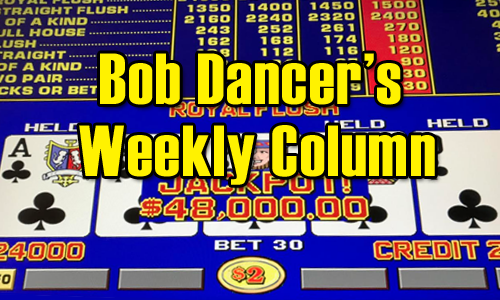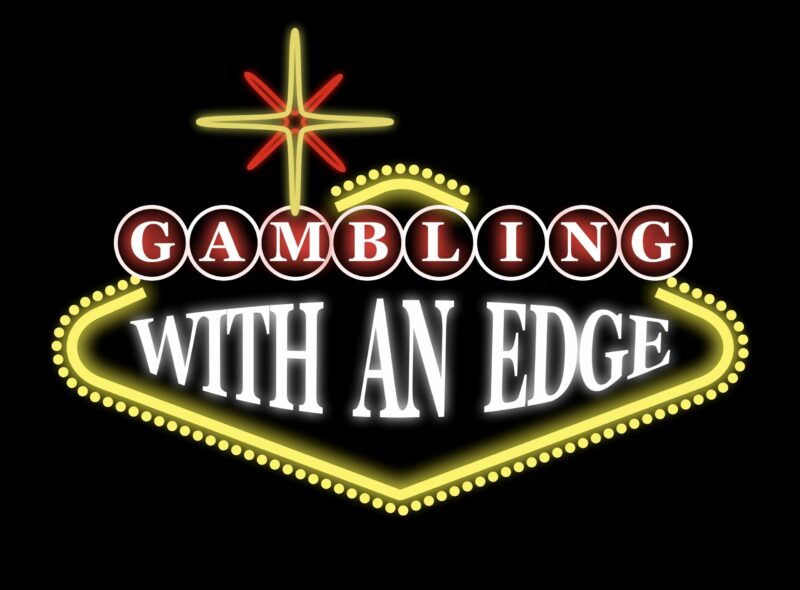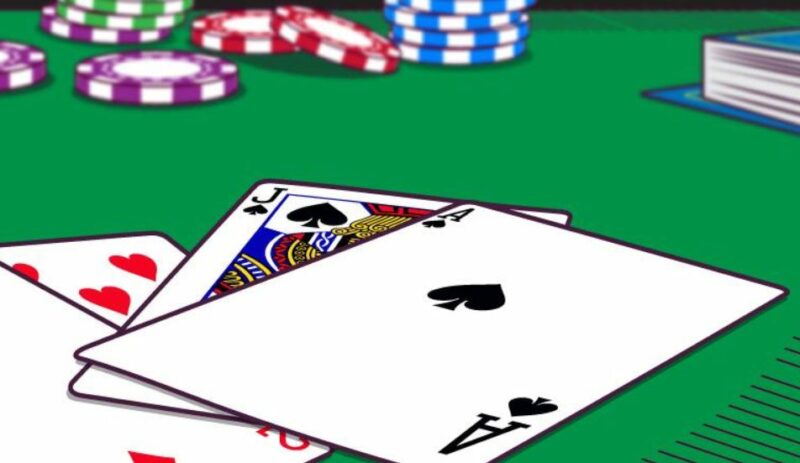My play at Railroad Pass had largely stopped. While they still had dollar $1 9/5 Triple Bonus Poker Plus with a 0.75% slot club on Wednesdays, I could only play 400-hands-per-hour on those coin-droppers. I had earlier played dollar 8/5 Bonus Poker Wheel Poker (99.59%), which was much more lucrative because it required $30 per hand to fully load. This was worth more, and was a lot more fun to play.
When that game was pulled, I pretty much retired from Railroad Pass, except for playing enough to keep my account active (at least one point every six months) so that my comp dollars didn’t evaporate.
And then I received a post card offering 10x points for 24 hours, starting on a Sunday midnight, a few weeks after I received the card. To check things out, I went in for a comped meal, played enough to verify that single points were still worth 0.25%, and that they had still had $1 7/5 Bonus Poker Wheel Poker. That game, worth 98.7%, before the slot club, became worth 101.2% — for a game I could average about $25,000 coin-in per hour. This multiplies out to $300 per hour — for as many hours as I could alertly play in 24 hours. There were eight machines, and they received relatively little play, so I wasn’t too concerned about having a back-up machine or two while waiting to be paid for a jackpot — of which I expected many.
I had the strategy for the 8/5 version of the game, and it didn’t take too long to figure out the 7/5 strategy — which was similar but not identical. The more strategies you figure out, the easier it is to figure out the next one. While this wasn’t that tough for me, it was a necessary part of my get-ready that I didn’t neglect.
I also reviewed the TBPP strategy, because even at only $2,000 coin-in per hour, this became a $46-per-hour opportunity when you add a 2.5% slot club. It seemed obvious to me that a $300-per-hour game in the players’ favor was a casino mistake. It would be a mistake for a large casino. But Railroad Pass is fairly small. If the slot director woke up before the event and figured out that he didn’t want a $300-per-hour liability and removed the game, I had a Plan B. Still, I hadn’t touched those machines since they were downgraded, so maybe they weren’t on his radar. Plus, if he were that good, he wouldn’t be working at Railroad Pass anyway. No offense, but being a slot director is a job that requires considerable skill, and the bigger places pay more to get skillful employees.
To create TITO tickets, I took an extra two trips to that casino at different times of the day, so my actions wouldn’t be seen by the same employees. The game I’d be playing generated a lot of W-2Gs, and I’d be paid in cash. When my time is worth $300-per-hour, I didn’t want to waste it inserting bunches of hundred-dollar bills into a bill acceptor. Plus starting with exactly $40,000 in tickets (or any other number), makes figuring out my win or loss at the end of the day easier. If I had pockets full of Benjamins, it would have been harder to know how much I started with.
I also reserved a room there beginning Sunday afternoon, checking out Tuesday. I wasn’t going to be playing 24 hours straight, but playing for ten, napping for four, and playing another ten was feasible if I could manage my schedule to be fully rested at midnight when the promotion started. And then if I needed it, I could rest upstairs before driving home.
Since we only lived 10 minutes away, it was a fairly close call as to whether or not to get a room. Sleeping in my own bed would give me better sleep than sleeping in a strange hotel bed. Still, there are a lot more distractions at home. So, I decided to avoid those distractions and stay at the casino. I left my computer at home. Plenty of potential distractions there. I did bring a book to read, in case, but expected to be too exhausted to read it.
I stayed up all Saturday night and Sunday morning. I checked into the hotel a little after noon, reviewed my strategy one more time, and went to sleep, setting the alarm for 11:00 p.m. After waking, I needed to eat before I played. While I can go a long time without eating when necessary, a long play burns some energy and better to have my tanks topped.
Before I ate, I verified the wheel poker machines were still there. They were. While the coffee shop isn’t the highest quality, it was the only place open on the property at that hour and had enough acceptable options. I reviewed the strategy over dinner (which didn’t take long — I knew it cold) and read my book.
At 12:05 a.m. I started to play. The player tracking system registered multiplied points. My first hand ($30) displayed 300 slot club points. That was the right number. Time to start pounding. The first quad came around in eight minutes. I spun the wheel and landed on $2,000! This was going to be a sweet promotion!
Well, maybe.
After two hours, I was behind $3,000. I had hit a number of quads, but not enough. You’re supposed to hit one on average every 417 hands or so, and I was probably averaging one in 600. After my first big wheel spin, the wheel was averaging 250 rather than 428. I was paying $6 per line and not receiving enough bonus on the quads to make up for that extra $1 per hand, so I was going downhill. The next two hours were better. I recouped the $3,000 and was up a little, thanks to a royal flush.
I had some good hours, got ahead several thousand dollars, and then my score fell. While my scores were bigger than those experienced my many of my readers, we’ve all been through these kinds of ups and downs. This was all happening between Sunday midnight and the start of the business day on Monday. It could easily happen that the slot director and general manager would come in, see what was happening, and change things. They could shut down the games, end the promotion, or disqualify me from further play. Probably they had other options as well.
By 10 a.m., I was ready for my scheduled break. I was ahead $2,000. I hoped conditions would be the same after my nap. I rested until 2:30 p.m., ate a quick lunch, and got back at the machines about 3:15. It probably would have been smarter to pack a lunch to gain another half-hour of play, but that didn’t occur to me until after the promotion.
The machines were as I left them. Same pay schedules. All available. Soon after I got back, I was dealt four deuces. This was worth $2,000 off the top, plus I had five spins — which added another $1,500 or so.
Instead of being paid by a slot floor person, however, this time the slot director herself came out and introduced herself. My supposition that the slot director was male turned out to be wrong. Most slot directors are male, but not all, and clearly not this one. I figured this was the end of the line and she would tell me the promotion was over, at least for me.
I figured wrong. She congratulated me on jackpot and actually encouraged me to “do it again!” I told her I’d try, but I wasn’t very good at getting dealt four-of-a-kinds to show up on my machine when I wanted them to. She smiled at my “joke.” She told me that only their top 50 players coin-in-wise over the past year got this offer, and one was disqualified because he had six people all playing on his card at the same time. But so long as everybody else kept playing by the rules, they were planning to ride the promotion out until it’s normal expiration at midnight.
I thought this was a classy move on their part. Nobody was playing more money through the machines than I was, and I didn’t end up making money. My score from then until midnight went downhill sharply. It seemed like they tightened a screw inside the machines — but I know that’s not possible. The machines were dealing fairly. But the quads took a vacation for several hours. We’ve all been there.
At the end of the day, after collecting the considerable cash back I earned that day, I had lost $3,500 — offset by about the same amount of future comps. I did receive nice mailers for a few months afterwards, but those eventually dried up as I didn’t continue to play much.
Before the play started, I figured it was worth almost $6,000 in cash plus more than $3,000 in comps plus another $500 or more in mailers. The last two parts of my prediction came true, but the actual cash came up short by almost ten grand.
It was a disappointing result for such a lucrative once-in-a-lifetime promotion. Not a disaster, by any means, but disappointing none-the-less. Still, looking back, there’s nothing I would have done differently, other than maybe pack a lunch for Monday afternoon. I identified the best machines to play. Learned the strategy perfectly. Managed my sleep so I could play the maximum number of hours. What more could I do? So long as I continue to play promotions that way, I like my chances of continuing to prosper.
Eventually my comps dried up — with the final amount being spent at Bonnie’s and my 15-person night-before-the-wedding dinner for our bridal party in 2014. She had been there several times during our courtship, liked one waitress particularly, and thought it would be the perfect venue. It had been almost a decade since the promotion. After that, I still came in periodically to eat and to play enough to keep my comps active, but not more than that.
In 2014, the dollar 7-5 Bonus Poker Wheel Poker machines were still there, not that I’d want to play them under normal circumstances. I haven’t been back since.





